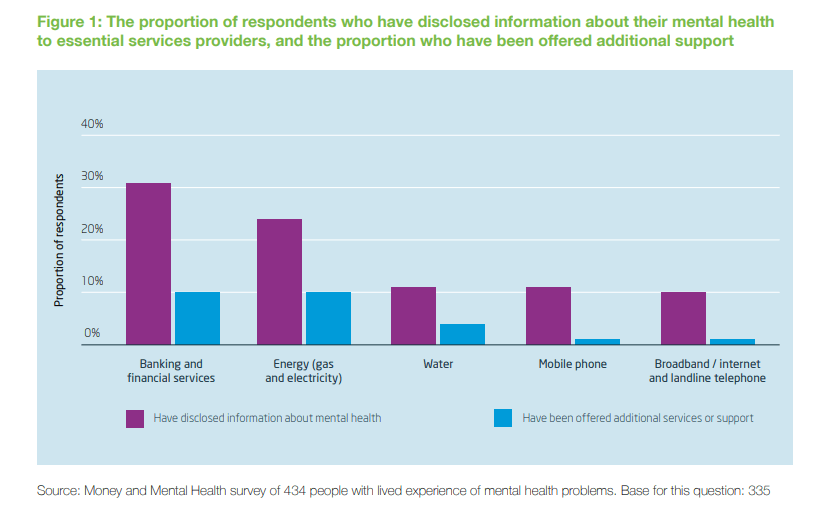
Katie Evans, Head of Research and Policy, Money and Mental Health
Balancing the risks of data sharing
Managing day-to-day tasks like paying bills can be enormously difficult if you’re experiencing a mental health problem which makes it hard even to eat properly and get dressed, or leaves you feeling hopeless. Many of the companies Money and Mental Health speak to would like to do more to help – but often, they don’t know which customers they need to be offering additional support to.
Difficulties of data sharing
That’s not surprising – although one in four people is experiencing a mental health problem at any given time, it’s not often something you would want to share with your energy provider or bank. Our recent research suggests that only a minority of people experiencing mental health problems disclose information about their condition to their suppliers – and that even when people share this information, they often don’t receive any additional help.

Disclosing a mental health condition is often a stressful experience. So we were pleased to see new research from the Personal Finance Research Centre at Bristol University, drawing on input from the Money and Mental Health Research Community, which explores whether data sharing between companies could help to limit the need for disclosure.
Weighing up the risks
Many of us are, rightly, concerned about the amount of data that is held about us, and what it is used for, as the recent Cambridge Analytica scandal has shown. So any move towards greater data sharing must come with a proper evaluation of the risks and benefits – and the new research by PFRC starts this much needed discussion.
Sharing data about disclosures across companies could have big benefits. It could increase the number of consumers experiencing mental health problems, or other difficulties, who receive additional support from firms, and reduce the stress of disclosure. However the risks of data being shared inappropriately or misused, perhaps to exploit more vulnerable customers, means that any system for data-sharing must be carefully set up and regulated.
Five steps to safe data sharing
The report helpfully sets out five building blocks for greater data sharing.
- Disclosure – creating an environment in which a customer understands why sharing information can be helpful and is willing to do so.
- Capture – building systems which can accurately record complex information about a person’s circumstances
- Hygiene – introducing processes which ensure data is correct and up-to-date
- Sharing – ensuring that systems and pathways for sharing data between companies are secure
- Control – ensuring that consumers always retain control of information about them, and can change or delete it if they want to
New data protection regulation which comes into force later this month should help to ensure that consumers are protected when they disclose sensitive information about their health. But at Money and Mental Health, we would argue that more needs to be done at a government level, as well as by firms, to ensure that we can unlock the benefits of data-sharing, while managing the risks.
The broader debate
Happily, it seems like progress is finally being made in this area. This report from PFRC is a helpful contribution, and comes just weeks after the government made a series of proposals to make better use of consumer data in its recent green paper. If data is to be used effectively to support consumers experiencing difficulties, we need more research like this, and a broader conversation between firms, consumers, regulators and government to ensure the right protections are in place.
Money and Mental Health is keen to be part of this debate, to ensure that systems meet the needs of the 12 million consumers across the UK experiencing mental health problems each year. As a first step, we’ll be addressing this in our response to the Department for Business, Energy and Industrial Strategy consultation this summer. If you have experienced a mental health problem, and have thoughts about whether you would be happy for your data to be shared and what protection you’d like in place, do join our Research Community to be part of the conversation.
